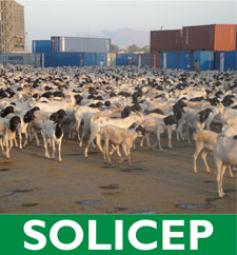Somali Livestock Certification Project

Project Brief/Background
In support of livestock development in Africa, AU-IBAR supports Member States to set and comply with essential trade standards relevant for animal and animal products including certification systems.
Rationale
Livestock trade is vital to Somali pastoralists and is a main source of revenue for Somalia. Import bans for Somali livestock which have been imposed by countries in the Arabian Peninsula from time to time, have impacted negatively on the Somalia economy. Trade restrictions on live animals, by importing countries, have mainly been aimed at limiting risks associated with Rift Valley Fever (RVF) and other trade limiting diseases. To sustain trading in live animals, Somalia and the Horn of Africa countries in general, have to develop an animal health certification system, which is acceptable by both the exporting and importing countries to ensure reduced risk of introduction of RVF and other transboundary animal diseases (TADs) into the importing countries. The system should also provide for enhanced communication on sanitary information between the trading partners.
Somalia Livestock Certification Project (SOLICEP) was AU-IBAR project funded by the European Union with the objective to improve export performance of the livestock sub-sector in Somalia and Somalia ecosystem.
SOLICEP achieved the above objective through the following results:
- An animal health certification model that promotes the OIE/WTO/SPS Standards for live animals, acceptable to both importing and exporting countries is defined and tested.
- The enhancement of capacity of Somali public and private institutions to improve access to international livestock markets.
- The enhancement of linkages among relevant Somali institutions and livestock trading partners.
Results and Activities
SOLICEP will achieve the above results by carrying out the following activities:
Result 1
Animal health certification model that promotes the OIE/WTO/SPS Standards for live animals and is acceptable to both importing and exporting countries is defined and tested
- Develop a model that will take into account the unique circumstances of nomadic husbandry practices.
- Disease and species specific animal health certification models will be developed, using epidemiological data, for rinderpest, RVF, FMD and PPR.
- The models will be evaluated and validated for technical, economic and financial feasibility.
- FAO together with the Somali authorities will lobby OIE, other international organizations and trading partners for acceptance of the proposed certification model.
Result 2
Capacity of Somali public and private institutions to improve access to international livestock markets enhanced
- A self-assessment Performance of Veterinary Services (PVS) will be undertaken to assess the state of the Somali veterinary services and to identify capacity building needs.
- Somali public and private personnel will be trained on animal health certification, international standards and requirements of trading partners.
- Investment funding to public and private sector institutions will be provided to support the implementation of the animal health certification system.
- Veterinary professional will be trained on disease data collection, collation, analysis and dissemination.
- Veterinary professionals will be trained on risk analysis.
- Web-based database on animal health certification and trade will be maintained on the websites of ministries and AU-IBAR.
- Institutions involved in certification process will be strengthened to establish & maintain the certification system.
Result 3
Linkages among relevant Somali institutions and livestock trading partners enhanced
- Sensitize and create awareness among stakeholders about animal health certification.
- Enhance communication about animal health certification among stakeholders in Somalia and with importing countries.
- Enhance technical coordination on animal health certification, trade and marketing for Somaliland, Puntland and central/south Somalia.
- Enhance communication with trading partners including disease notification to OIE and AU-IBAR.
- Train key personnel on trade negotiations.
Communication and Visibility
| Attachment | Size |
|---|---|
| doc_20111124_solicep_brochure_ar.pdf (1.41 MB) | 1.41 MB |
| doc_20111124_solicep_brochure_en.pdf (688.3 KB) | 688.3 KB |
| doc_20111124_solicep_brochure_fr.pdf (713.17 KB) | 713.17 KB |
Resources
Other Notes
Workshops and Meetings
Inception workshop
AU-IBAR rolled out the programme with a successful regional inception workshop. Launching this innovative project, AU/IBAR had invited all stakeholders to an inception workshop at the African Union Headquarters to discuss the envisaged process,identify the main issues at stake and reach a broad consensus on the concrete targets.
Trade and transboundary animal diseases in the Horn of Africa
SOLICEP hosted a workshop on export trade to the Arabian Peninsula and the Middle East 30 March—3 April in Nairobi. This workshop was the first of a series intended to deal with stabilization of regional export markets for livestock and animal origin products and support of pastoral livelihoods in the lowland areas of the Horn of Africa nations. The specific focus of this workshop is export trade to the Arabian Peninsula and Middle East. Subsequent workshops will deal with expanded trade within the Eastern Africa and COMESA regions.
